Analysis of Risk and Trust Concepts in Contemporary Social Theories
VerifiedAdded on 2020/06/04
|8
|1992
|219
Essay
AI Summary
This essay delves into the essential concepts of risk and trust within contemporary sociological theories, with a particular emphasis on the work of Anthony Giddens. The introduction defines trust as a favorable opinion within a society, highlighting its importance in modern contexts where face-to-face interactions are less frequent. The main body explores Giddens' perspective on trust as confidence in given outcomes, and its complexities in modern society, including the impact of social changes like divorce and evolving family structures on individual trust. The essay examines how Giddens identifies four major aspects of modern society: distanciation, power, risk, and trust. It contrasts traditional societies, where trust was based on shared values, with modern societies, where individuals have more freedom and base trust on personal characteristics and benefits. The essay also touches upon the views of other theorists like Ferdinant Tonnies, James Coleman, Fukuyama, and Engelhard, providing a comprehensive overview of how trust is developed, maintained, and influenced by various social and economic factors. The conclusion reiterates the importance of relationships and self-interest in shaping trust, and how the modern era's employment and welfare systems have altered the dynamics of trust within society.
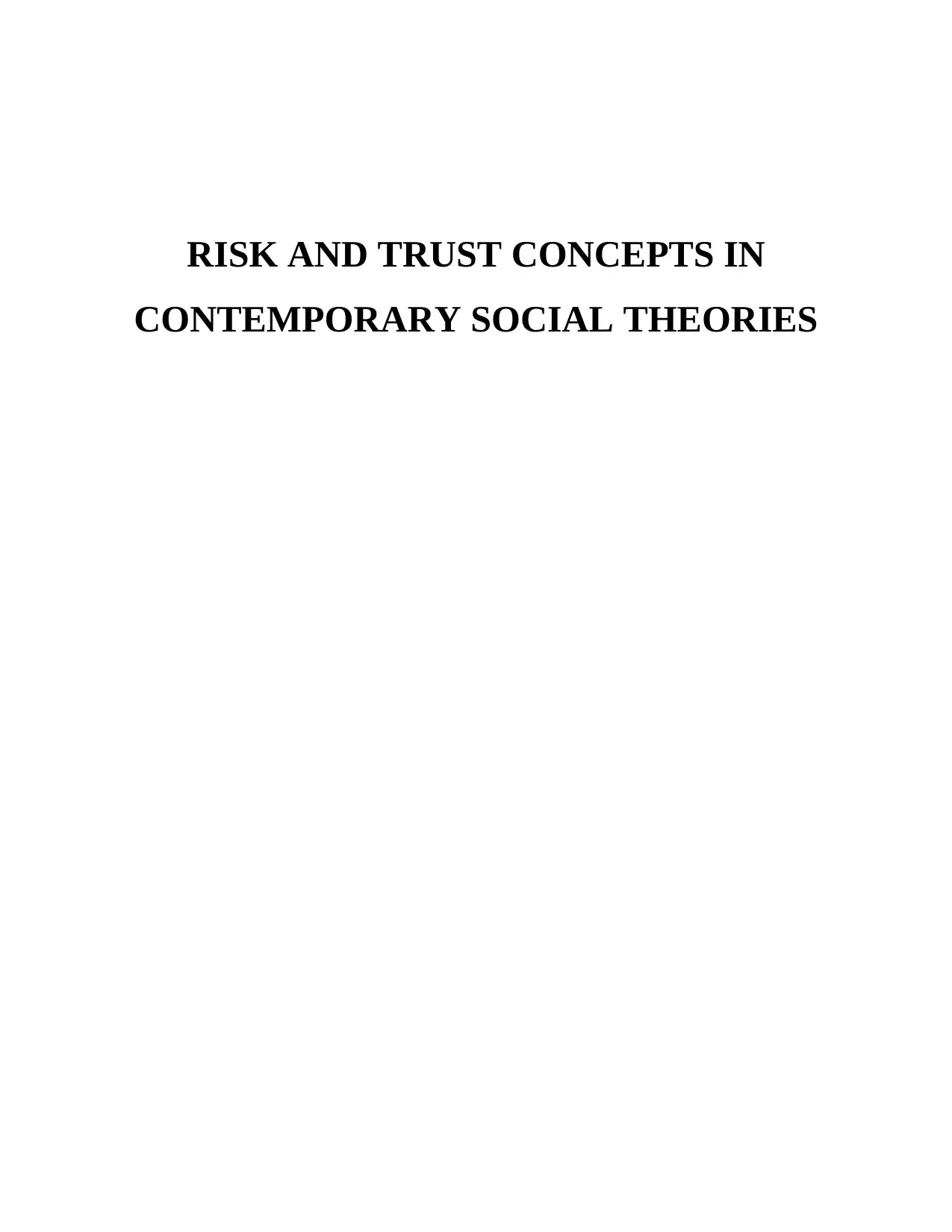
RISK AND TRUST CONCEPTS IN
CONTEMPORARY SOCIAL THEORIES
CONTEMPORARY SOCIAL THEORIES
Paraphrase This Document
Need a fresh take? Get an instant paraphrase of this document with our AI Paraphraser
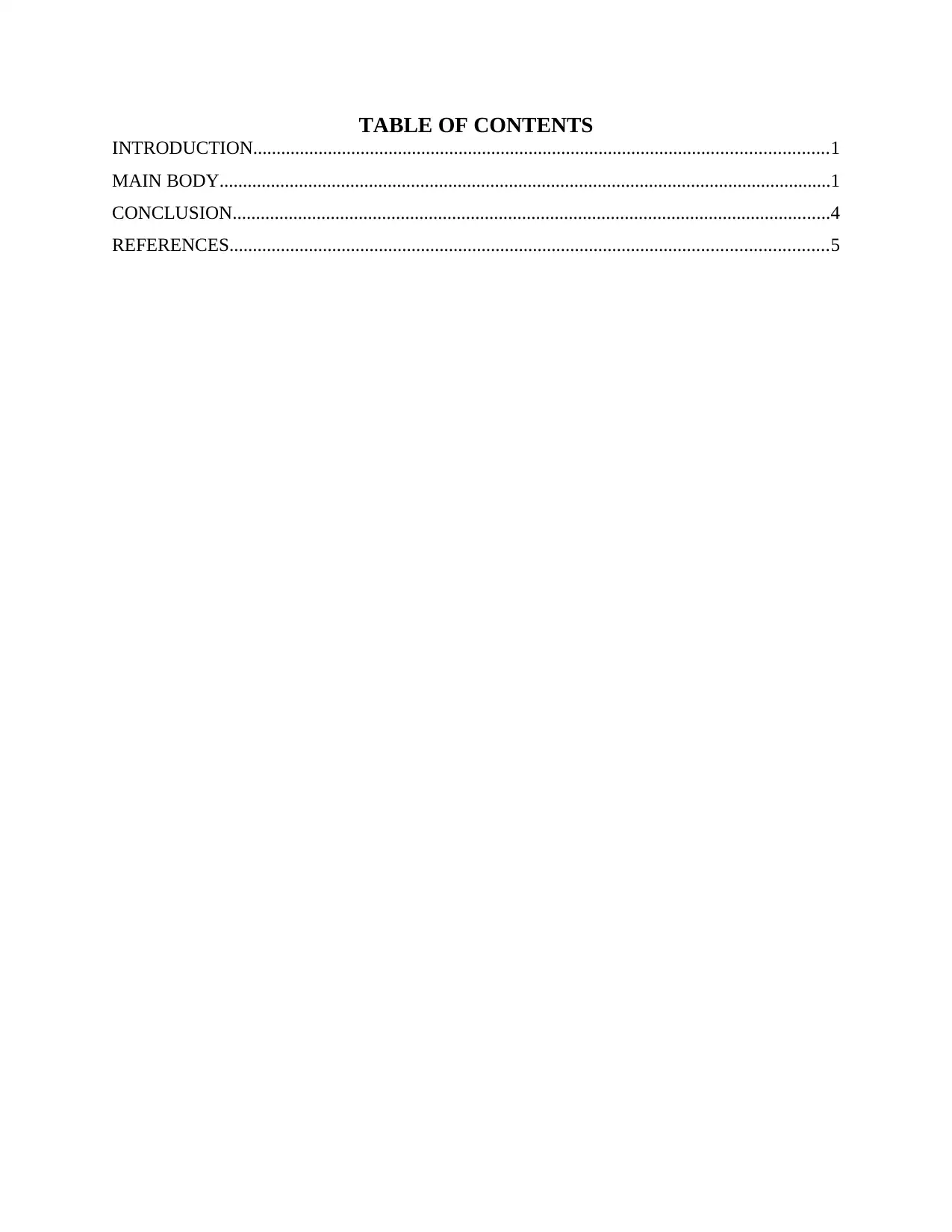
TABLE OF CONTENTS
INTRODUCTION...........................................................................................................................1
MAIN BODY...................................................................................................................................1
CONCLUSION................................................................................................................................4
REFERENCES................................................................................................................................5
INTRODUCTION...........................................................................................................................1
MAIN BODY...................................................................................................................................1
CONCLUSION................................................................................................................................4
REFERENCES................................................................................................................................5
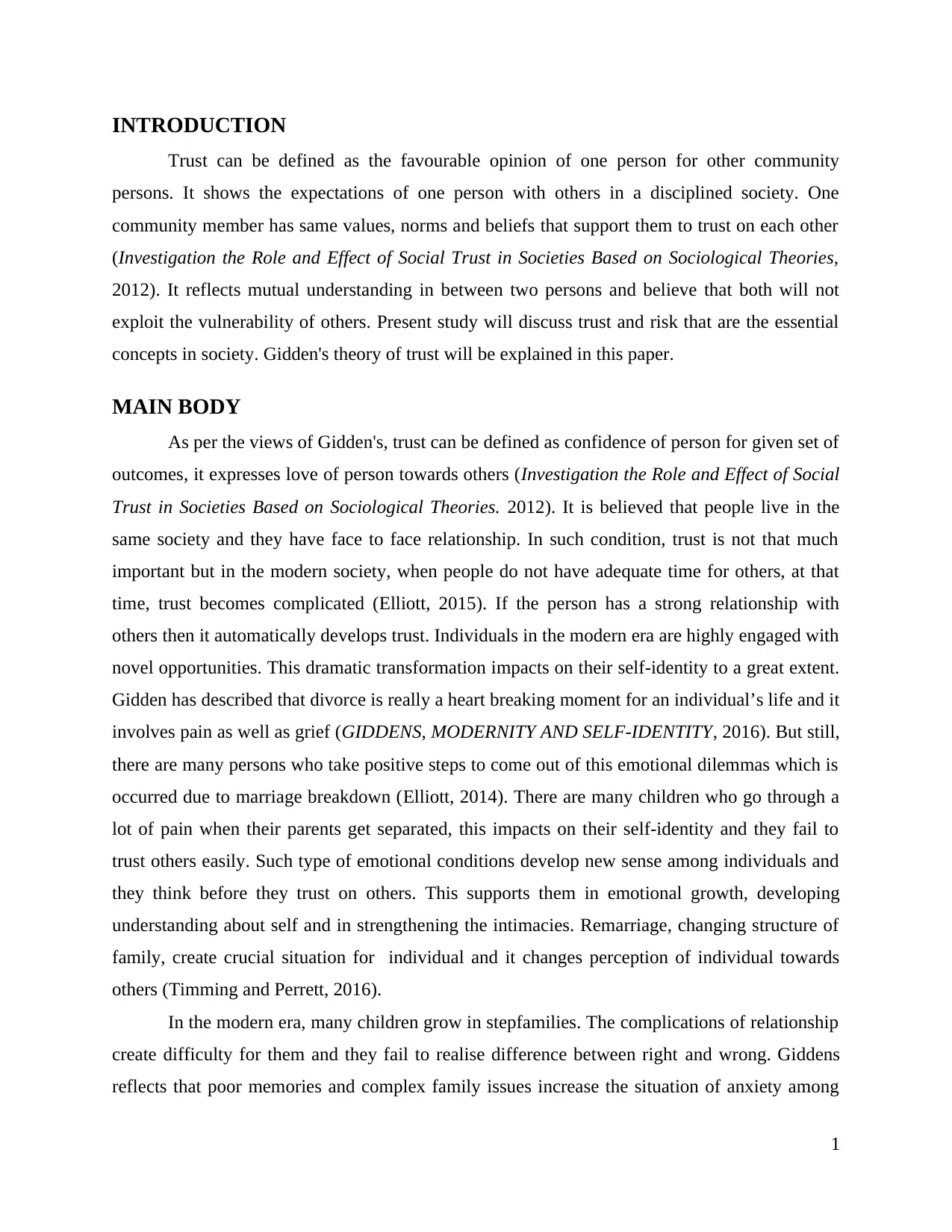
INTRODUCTION
Trust can be defined as the favourable opinion of one person for other community
persons. It shows the expectations of one person with others in a disciplined society. One
community member has same values, norms and beliefs that support them to trust on each other
(Investigation the Role and Effect of Social Trust in Societies Based on Sociological Theories,
2012). It reflects mutual understanding in between two persons and believe that both will not
exploit the vulnerability of others. Present study will discuss trust and risk that are the essential
concepts in society. Gidden's theory of trust will be explained in this paper.
MAIN BODY
As per the views of Gidden's, trust can be defined as confidence of person for given set of
outcomes, it expresses love of person towards others (Investigation the Role and Effect of Social
Trust in Societies Based on Sociological Theories. 2012). It is believed that people live in the
same society and they have face to face relationship. In such condition, trust is not that much
important but in the modern society, when people do not have adequate time for others, at that
time, trust becomes complicated (Elliott, 2015). If the person has a strong relationship with
others then it automatically develops trust. Individuals in the modern era are highly engaged with
novel opportunities. This dramatic transformation impacts on their self-identity to a great extent.
Gidden has described that divorce is really a heart breaking moment for an individual’s life and it
involves pain as well as grief (GIDDENS, MODERNITY AND SELF-IDENTITY, 2016). But still,
there are many persons who take positive steps to come out of this emotional dilemmas which is
occurred due to marriage breakdown (Elliott, 2014). There are many children who go through a
lot of pain when their parents get separated, this impacts on their self-identity and they fail to
trust others easily. Such type of emotional conditions develop new sense among individuals and
they think before they trust on others. This supports them in emotional growth, developing
understanding about self and in strengthening the intimacies. Remarriage, changing structure of
family, create crucial situation for individual and it changes perception of individual towards
others (Timming and Perrett, 2016).
In the modern era, many children grow in stepfamilies. The complications of relationship
create difficulty for them and they fail to realise difference between right and wrong. Giddens
reflects that poor memories and complex family issues increase the situation of anxiety among
1
Trust can be defined as the favourable opinion of one person for other community
persons. It shows the expectations of one person with others in a disciplined society. One
community member has same values, norms and beliefs that support them to trust on each other
(Investigation the Role and Effect of Social Trust in Societies Based on Sociological Theories,
2012). It reflects mutual understanding in between two persons and believe that both will not
exploit the vulnerability of others. Present study will discuss trust and risk that are the essential
concepts in society. Gidden's theory of trust will be explained in this paper.
MAIN BODY
As per the views of Gidden's, trust can be defined as confidence of person for given set of
outcomes, it expresses love of person towards others (Investigation the Role and Effect of Social
Trust in Societies Based on Sociological Theories. 2012). It is believed that people live in the
same society and they have face to face relationship. In such condition, trust is not that much
important but in the modern society, when people do not have adequate time for others, at that
time, trust becomes complicated (Elliott, 2015). If the person has a strong relationship with
others then it automatically develops trust. Individuals in the modern era are highly engaged with
novel opportunities. This dramatic transformation impacts on their self-identity to a great extent.
Gidden has described that divorce is really a heart breaking moment for an individual’s life and it
involves pain as well as grief (GIDDENS, MODERNITY AND SELF-IDENTITY, 2016). But still,
there are many persons who take positive steps to come out of this emotional dilemmas which is
occurred due to marriage breakdown (Elliott, 2014). There are many children who go through a
lot of pain when their parents get separated, this impacts on their self-identity and they fail to
trust others easily. Such type of emotional conditions develop new sense among individuals and
they think before they trust on others. This supports them in emotional growth, developing
understanding about self and in strengthening the intimacies. Remarriage, changing structure of
family, create crucial situation for individual and it changes perception of individual towards
others (Timming and Perrett, 2016).
In the modern era, many children grow in stepfamilies. The complications of relationship
create difficulty for them and they fail to realise difference between right and wrong. Giddens
reflects that poor memories and complex family issues increase the situation of anxiety among
1
⊘ This is a preview!⊘
Do you want full access?
Subscribe today to unlock all pages.

Trusted by 1+ million students worldwide
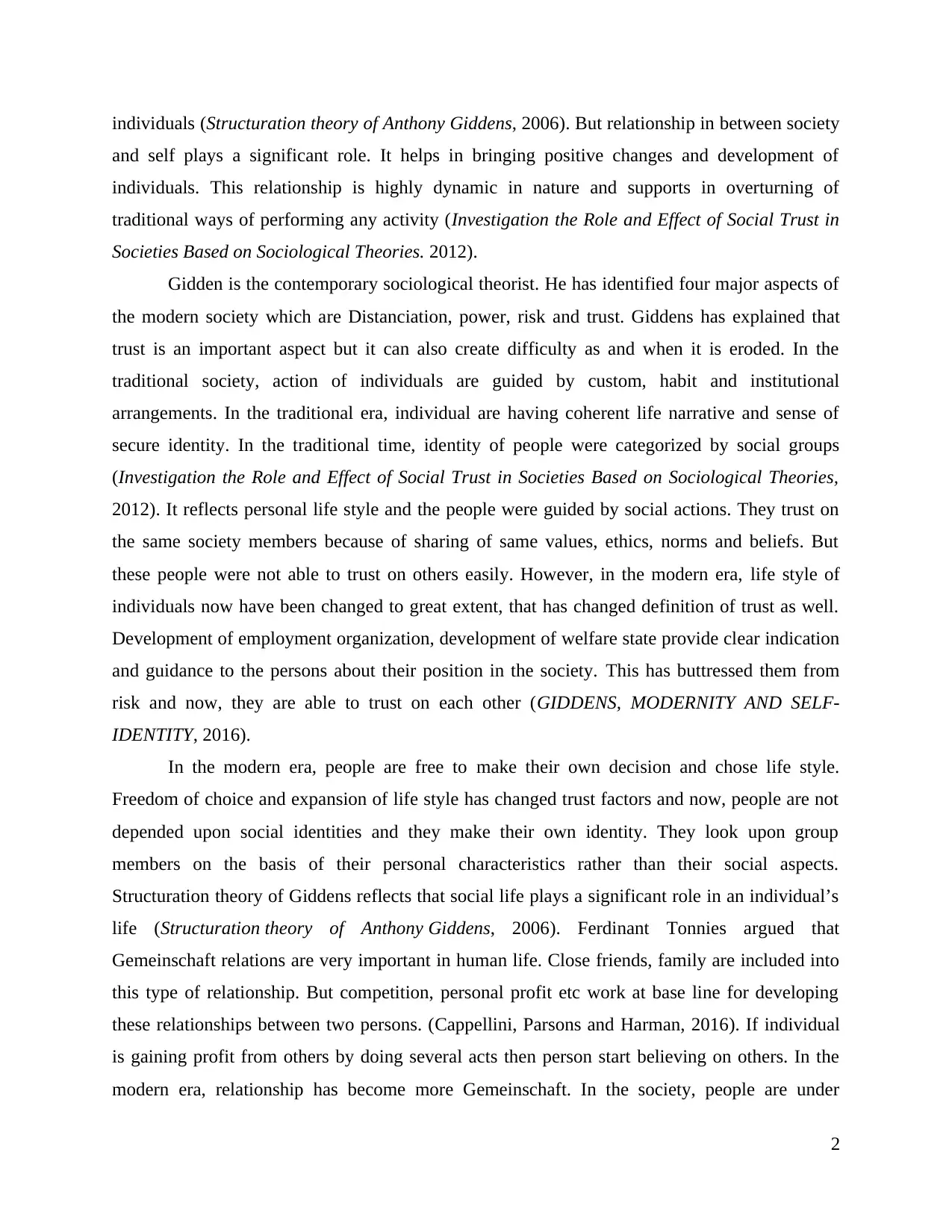
individuals (Structuration theory of Anthony Giddens, 2006). But relationship in between society
and self plays a significant role. It helps in bringing positive changes and development of
individuals. This relationship is highly dynamic in nature and supports in overturning of
traditional ways of performing any activity (Investigation the Role and Effect of Social Trust in
Societies Based on Sociological Theories. 2012).
Gidden is the contemporary sociological theorist. He has identified four major aspects of
the modern society which are Distanciation, power, risk and trust. Giddens has explained that
trust is an important aspect but it can also create difficulty as and when it is eroded. In the
traditional society, action of individuals are guided by custom, habit and institutional
arrangements. In the traditional era, individual are having coherent life narrative and sense of
secure identity. In the traditional time, identity of people were categorized by social groups
(Investigation the Role and Effect of Social Trust in Societies Based on Sociological Theories,
2012). It reflects personal life style and the people were guided by social actions. They trust on
the same society members because of sharing of same values, ethics, norms and beliefs. But
these people were not able to trust on others easily. However, in the modern era, life style of
individuals now have been changed to great extent, that has changed definition of trust as well.
Development of employment organization, development of welfare state provide clear indication
and guidance to the persons about their position in the society. This has buttressed them from
risk and now, they are able to trust on each other (GIDDENS, MODERNITY AND SELF-
IDENTITY, 2016).
In the modern era, people are free to make their own decision and chose life style.
Freedom of choice and expansion of life style has changed trust factors and now, people are not
depended upon social identities and they make their own identity. They look upon group
members on the basis of their personal characteristics rather than their social aspects.
Structuration theory of Giddens reflects that social life plays a significant role in an individual’s
life (Structuration theory of Anthony Giddens, 2006). Ferdinant Tonnies argued that
Gemeinschaft relations are very important in human life. Close friends, family are included into
this type of relationship. But competition, personal profit etc work at base line for developing
these relationships between two persons. (Cappellini, Parsons and Harman, 2016). If individual
is gaining profit from others by doing several acts then person start believing on others. In the
modern era, relationship has become more Gemeinschaft. In the society, people are under
2
and self plays a significant role. It helps in bringing positive changes and development of
individuals. This relationship is highly dynamic in nature and supports in overturning of
traditional ways of performing any activity (Investigation the Role and Effect of Social Trust in
Societies Based on Sociological Theories. 2012).
Gidden is the contemporary sociological theorist. He has identified four major aspects of
the modern society which are Distanciation, power, risk and trust. Giddens has explained that
trust is an important aspect but it can also create difficulty as and when it is eroded. In the
traditional society, action of individuals are guided by custom, habit and institutional
arrangements. In the traditional era, individual are having coherent life narrative and sense of
secure identity. In the traditional time, identity of people were categorized by social groups
(Investigation the Role and Effect of Social Trust in Societies Based on Sociological Theories,
2012). It reflects personal life style and the people were guided by social actions. They trust on
the same society members because of sharing of same values, ethics, norms and beliefs. But
these people were not able to trust on others easily. However, in the modern era, life style of
individuals now have been changed to great extent, that has changed definition of trust as well.
Development of employment organization, development of welfare state provide clear indication
and guidance to the persons about their position in the society. This has buttressed them from
risk and now, they are able to trust on each other (GIDDENS, MODERNITY AND SELF-
IDENTITY, 2016).
In the modern era, people are free to make their own decision and chose life style.
Freedom of choice and expansion of life style has changed trust factors and now, people are not
depended upon social identities and they make their own identity. They look upon group
members on the basis of their personal characteristics rather than their social aspects.
Structuration theory of Giddens reflects that social life plays a significant role in an individual’s
life (Structuration theory of Anthony Giddens, 2006). Ferdinant Tonnies argued that
Gemeinschaft relations are very important in human life. Close friends, family are included into
this type of relationship. But competition, personal profit etc work at base line for developing
these relationships between two persons. (Cappellini, Parsons and Harman, 2016). If individual
is gaining profit from others by doing several acts then person start believing on others. In the
modern era, relationship has become more Gemeinschaft. In the society, people are under
2
Paraphrase This Document
Need a fresh take? Get an instant paraphrase of this document with our AI Paraphraser
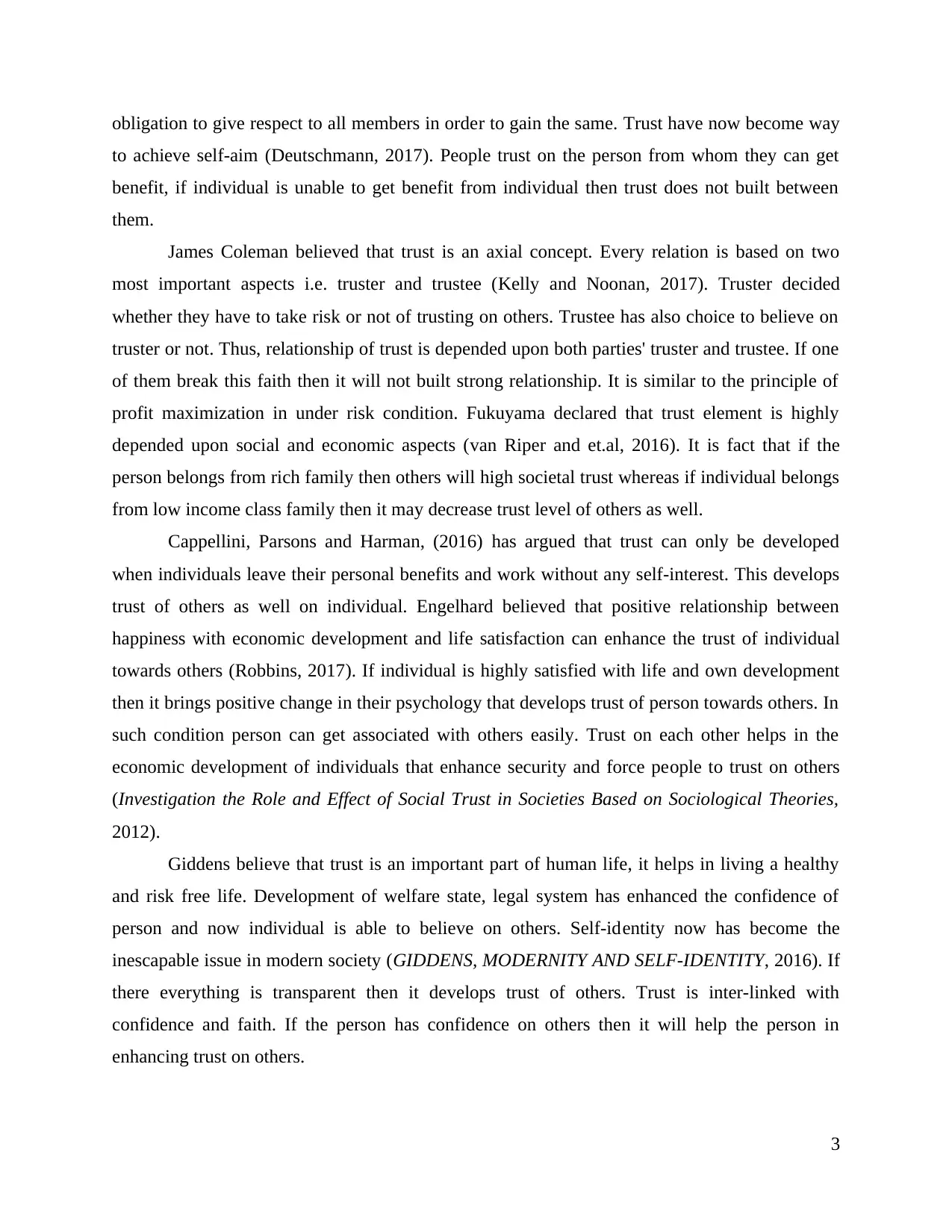
obligation to give respect to all members in order to gain the same. Trust have now become way
to achieve self-aim (Deutschmann, 2017). People trust on the person from whom they can get
benefit, if individual is unable to get benefit from individual then trust does not built between
them.
James Coleman believed that trust is an axial concept. Every relation is based on two
most important aspects i.e. truster and trustee (Kelly and Noonan, 2017). Truster decided
whether they have to take risk or not of trusting on others. Trustee has also choice to believe on
truster or not. Thus, relationship of trust is depended upon both parties' truster and trustee. If one
of them break this faith then it will not built strong relationship. It is similar to the principle of
profit maximization in under risk condition. Fukuyama declared that trust element is highly
depended upon social and economic aspects (van Riper and et.al, 2016). It is fact that if the
person belongs from rich family then others will high societal trust whereas if individual belongs
from low income class family then it may decrease trust level of others as well.
Cappellini, Parsons and Harman, (2016) has argued that trust can only be developed
when individuals leave their personal benefits and work without any self-interest. This develops
trust of others as well on individual. Engelhard believed that positive relationship between
happiness with economic development and life satisfaction can enhance the trust of individual
towards others (Robbins, 2017). If individual is highly satisfied with life and own development
then it brings positive change in their psychology that develops trust of person towards others. In
such condition person can get associated with others easily. Trust on each other helps in the
economic development of individuals that enhance security and force people to trust on others
(Investigation the Role and Effect of Social Trust in Societies Based on Sociological Theories,
2012).
Giddens believe that trust is an important part of human life, it helps in living a healthy
and risk free life. Development of welfare state, legal system has enhanced the confidence of
person and now individual is able to believe on others. Self-identity now has become the
inescapable issue in modern society (GIDDENS, MODERNITY AND SELF-IDENTITY, 2016). If
there everything is transparent then it develops trust of others. Trust is inter-linked with
confidence and faith. If the person has confidence on others then it will help the person in
enhancing trust on others.
3
to achieve self-aim (Deutschmann, 2017). People trust on the person from whom they can get
benefit, if individual is unable to get benefit from individual then trust does not built between
them.
James Coleman believed that trust is an axial concept. Every relation is based on two
most important aspects i.e. truster and trustee (Kelly and Noonan, 2017). Truster decided
whether they have to take risk or not of trusting on others. Trustee has also choice to believe on
truster or not. Thus, relationship of trust is depended upon both parties' truster and trustee. If one
of them break this faith then it will not built strong relationship. It is similar to the principle of
profit maximization in under risk condition. Fukuyama declared that trust element is highly
depended upon social and economic aspects (van Riper and et.al, 2016). It is fact that if the
person belongs from rich family then others will high societal trust whereas if individual belongs
from low income class family then it may decrease trust level of others as well.
Cappellini, Parsons and Harman, (2016) has argued that trust can only be developed
when individuals leave their personal benefits and work without any self-interest. This develops
trust of others as well on individual. Engelhard believed that positive relationship between
happiness with economic development and life satisfaction can enhance the trust of individual
towards others (Robbins, 2017). If individual is highly satisfied with life and own development
then it brings positive change in their psychology that develops trust of person towards others. In
such condition person can get associated with others easily. Trust on each other helps in the
economic development of individuals that enhance security and force people to trust on others
(Investigation the Role and Effect of Social Trust in Societies Based on Sociological Theories,
2012).
Giddens believe that trust is an important part of human life, it helps in living a healthy
and risk free life. Development of welfare state, legal system has enhanced the confidence of
person and now individual is able to believe on others. Self-identity now has become the
inescapable issue in modern society (GIDDENS, MODERNITY AND SELF-IDENTITY, 2016). If
there everything is transparent then it develops trust of others. Trust is inter-linked with
confidence and faith. If the person has confidence on others then it will help the person in
enhancing trust on others.
3
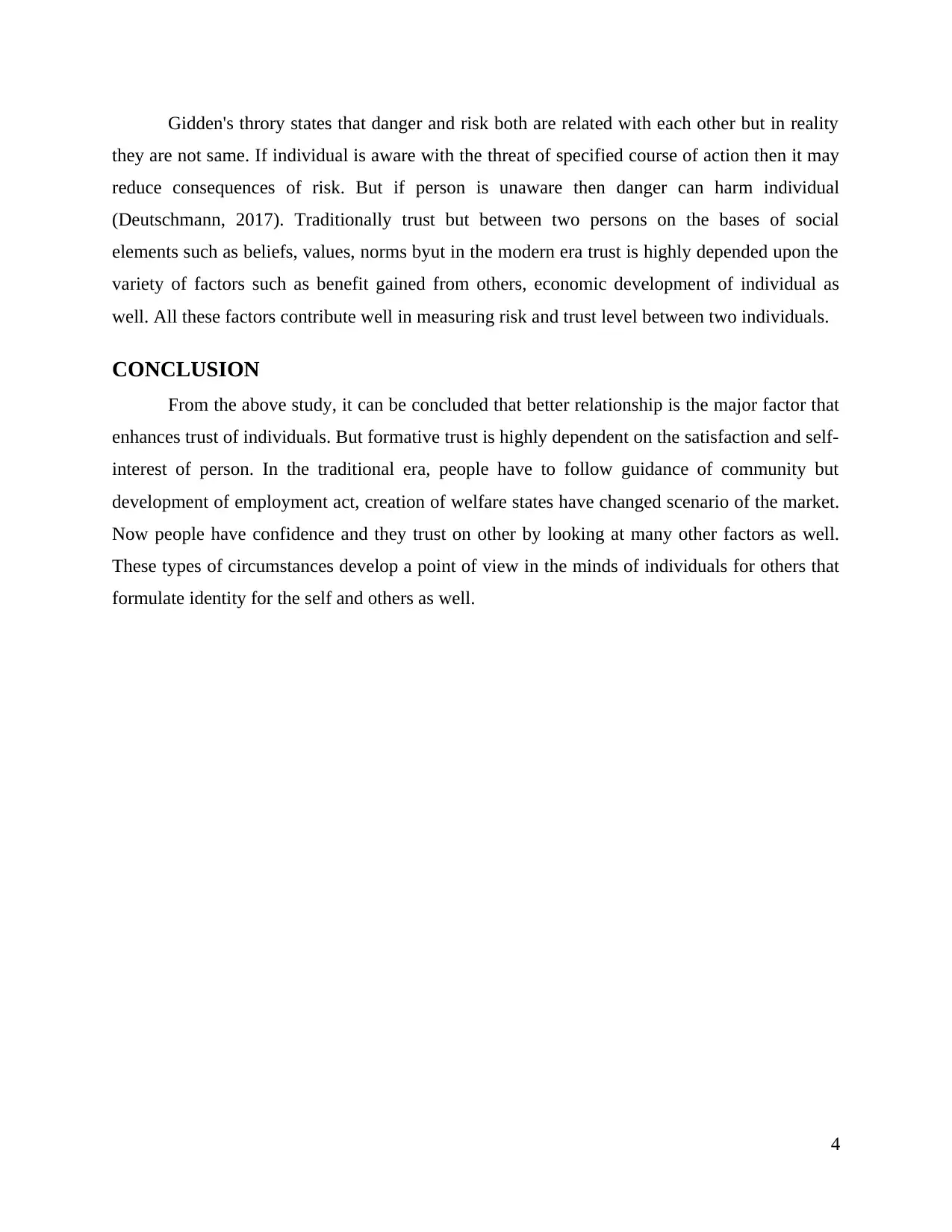
Gidden's throry states that danger and risk both are related with each other but in reality
they are not same. If individual is aware with the threat of specified course of action then it may
reduce consequences of risk. But if person is unaware then danger can harm individual
(Deutschmann, 2017). Traditionally trust but between two persons on the bases of social
elements such as beliefs, values, norms byut in the modern era trust is highly depended upon the
variety of factors such as benefit gained from others, economic development of individual as
well. All these factors contribute well in measuring risk and trust level between two individuals.
CONCLUSION
From the above study, it can be concluded that better relationship is the major factor that
enhances trust of individuals. But formative trust is highly dependent on the satisfaction and self-
interest of person. In the traditional era, people have to follow guidance of community but
development of employment act, creation of welfare states have changed scenario of the market.
Now people have confidence and they trust on other by looking at many other factors as well.
These types of circumstances develop a point of view in the minds of individuals for others that
formulate identity for the self and others as well.
4
they are not same. If individual is aware with the threat of specified course of action then it may
reduce consequences of risk. But if person is unaware then danger can harm individual
(Deutschmann, 2017). Traditionally trust but between two persons on the bases of social
elements such as beliefs, values, norms byut in the modern era trust is highly depended upon the
variety of factors such as benefit gained from others, economic development of individual as
well. All these factors contribute well in measuring risk and trust level between two individuals.
CONCLUSION
From the above study, it can be concluded that better relationship is the major factor that
enhances trust of individuals. But formative trust is highly dependent on the satisfaction and self-
interest of person. In the traditional era, people have to follow guidance of community but
development of employment act, creation of welfare states have changed scenario of the market.
Now people have confidence and they trust on other by looking at many other factors as well.
These types of circumstances develop a point of view in the minds of individuals for others that
formulate identity for the self and others as well.
4
⊘ This is a preview!⊘
Do you want full access?
Subscribe today to unlock all pages.

Trusted by 1+ million students worldwide
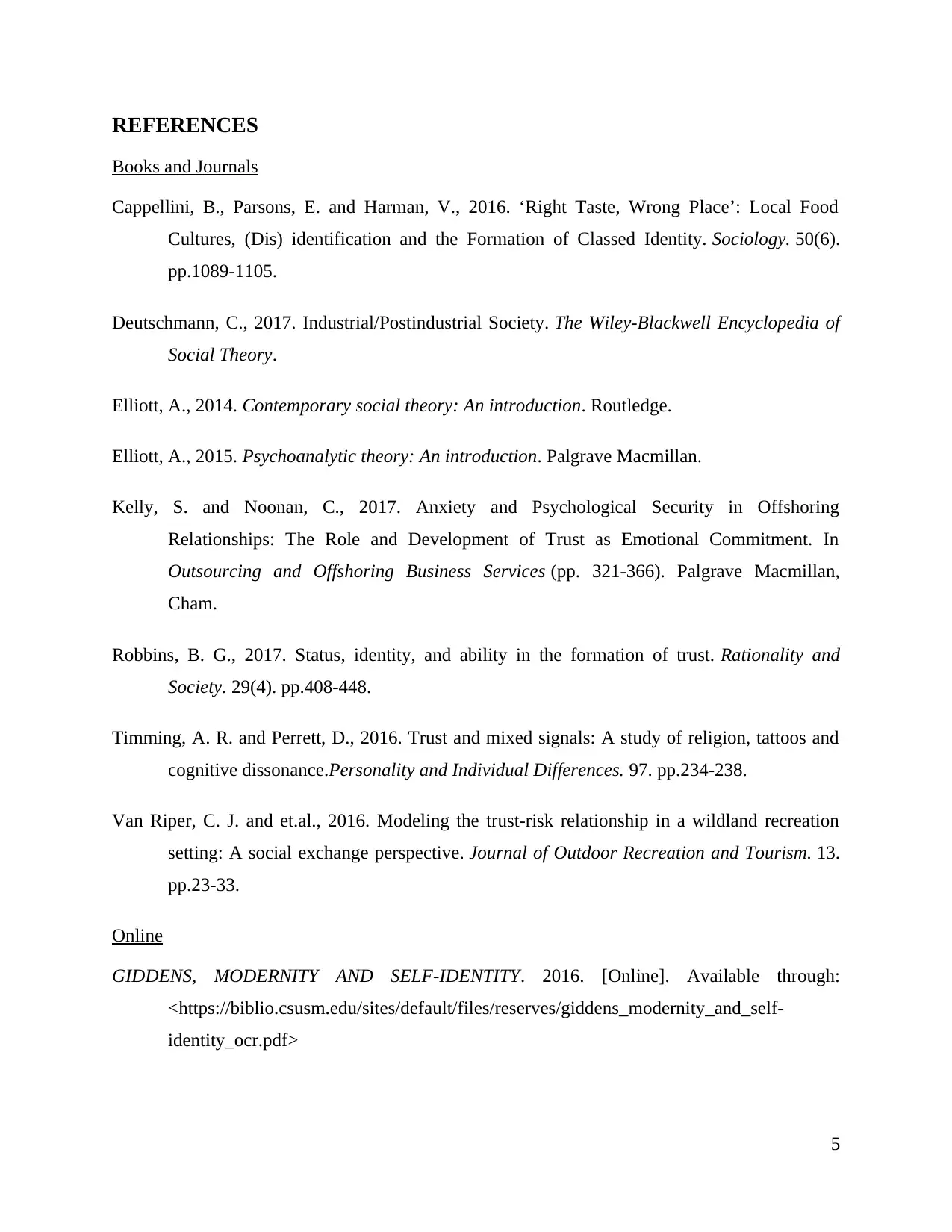
REFERENCES
Books and Journals
Cappellini, B., Parsons, E. and Harman, V., 2016. ‘Right Taste, Wrong Place’: Local Food
Cultures, (Dis) identification and the Formation of Classed Identity. Sociology. 50(6).
pp.1089-1105.
Deutschmann, C., 2017. Industrial/Postindustrial Society. The Wiley‐Blackwell Encyclopedia of
Social Theory.
Elliott, A., 2014. Contemporary social theory: An introduction. Routledge.
Elliott, A., 2015. Psychoanalytic theory: An introduction. Palgrave Macmillan.
Kelly, S. and Noonan, C., 2017. Anxiety and Psychological Security in Offshoring
Relationships: The Role and Development of Trust as Emotional Commitment. In
Outsourcing and Offshoring Business Services (pp. 321-366). Palgrave Macmillan,
Cham.
Robbins, B. G., 2017. Status, identity, and ability in the formation of trust. Rationality and
Society. 29(4). pp.408-448.
Timming, A. R. and Perrett, D., 2016. Trust and mixed signals: A study of religion, tattoos and
cognitive dissonance.Personality and Individual Differences. 97. pp.234-238.
Van Riper, C. J. and et.al., 2016. Modeling the trust-risk relationship in a wildland recreation
setting: A social exchange perspective. Journal of Outdoor Recreation and Tourism. 13.
pp.23-33.
Online
GIDDENS, MODERNITY AND SELF-IDENTITY. 2016. [Online]. Available through:
<https://biblio.csusm.edu/sites/default/files/reserves/giddens_modernity_and_self-
identity_ocr.pdf>
5
Books and Journals
Cappellini, B., Parsons, E. and Harman, V., 2016. ‘Right Taste, Wrong Place’: Local Food
Cultures, (Dis) identification and the Formation of Classed Identity. Sociology. 50(6).
pp.1089-1105.
Deutschmann, C., 2017. Industrial/Postindustrial Society. The Wiley‐Blackwell Encyclopedia of
Social Theory.
Elliott, A., 2014. Contemporary social theory: An introduction. Routledge.
Elliott, A., 2015. Psychoanalytic theory: An introduction. Palgrave Macmillan.
Kelly, S. and Noonan, C., 2017. Anxiety and Psychological Security in Offshoring
Relationships: The Role and Development of Trust as Emotional Commitment. In
Outsourcing and Offshoring Business Services (pp. 321-366). Palgrave Macmillan,
Cham.
Robbins, B. G., 2017. Status, identity, and ability in the formation of trust. Rationality and
Society. 29(4). pp.408-448.
Timming, A. R. and Perrett, D., 2016. Trust and mixed signals: A study of religion, tattoos and
cognitive dissonance.Personality and Individual Differences. 97. pp.234-238.
Van Riper, C. J. and et.al., 2016. Modeling the trust-risk relationship in a wildland recreation
setting: A social exchange perspective. Journal of Outdoor Recreation and Tourism. 13.
pp.23-33.
Online
GIDDENS, MODERNITY AND SELF-IDENTITY. 2016. [Online]. Available through:
<https://biblio.csusm.edu/sites/default/files/reserves/giddens_modernity_and_self-
identity_ocr.pdf>
5
Paraphrase This Document
Need a fresh take? Get an instant paraphrase of this document with our AI Paraphraser
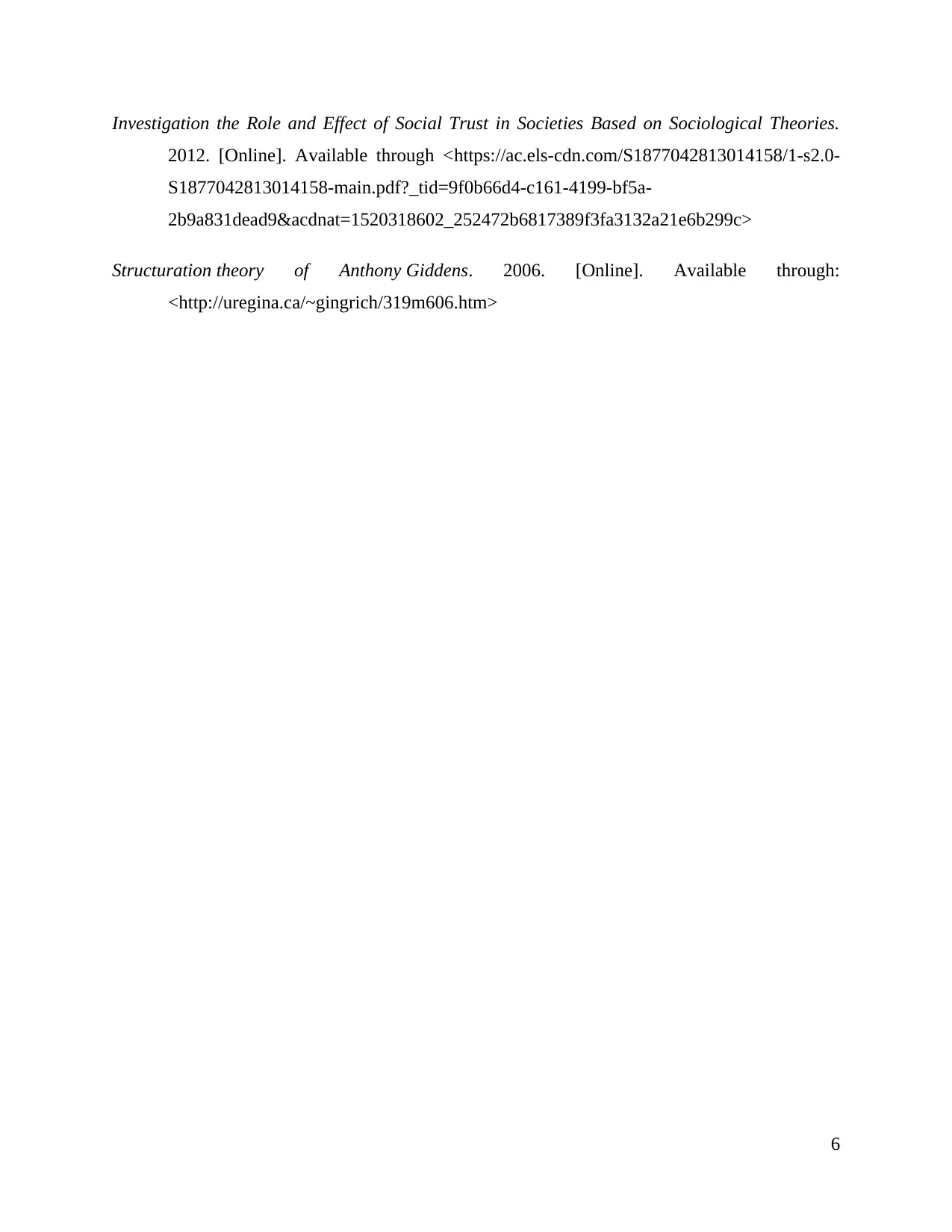
Investigation the Role and Effect of Social Trust in Societies Based on Sociological Theories.
2012. [Online]. Available through <https://ac.els-cdn.com/S1877042813014158/1-s2.0-
S1877042813014158-main.pdf?_tid=9f0b66d4-c161-4199-bf5a-
2b9a831dead9&acdnat=1520318602_252472b6817389f3fa3132a21e6b299c>
Structuration theory of Anthony Giddens. 2006. [Online]. Available through:
<http://uregina.ca/~gingrich/319m606.htm>
6
2012. [Online]. Available through <https://ac.els-cdn.com/S1877042813014158/1-s2.0-
S1877042813014158-main.pdf?_tid=9f0b66d4-c161-4199-bf5a-
2b9a831dead9&acdnat=1520318602_252472b6817389f3fa3132a21e6b299c>
Structuration theory of Anthony Giddens. 2006. [Online]. Available through:
<http://uregina.ca/~gingrich/319m606.htm>
6
1 out of 8
Related Documents
Your All-in-One AI-Powered Toolkit for Academic Success.
+13062052269
info@desklib.com
Available 24*7 on WhatsApp / Email
![[object Object]](/_next/static/media/star-bottom.7253800d.svg)
Unlock your academic potential
Copyright © 2020–2026 A2Z Services. All Rights Reserved. Developed and managed by ZUCOL.





